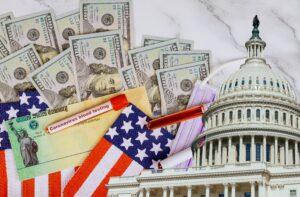Imagine everyone stopped spending money overnight. It may seem implausible, yet this hypothetical scenario exposes important insights into our global economy and society. This experiment shows how consumer spending affects businesses, governments, and communities.
Consumer spending drives a monetary boom. It supports corporations, jobs, and public services via taxation. When customers prevent spending, this engine stops, inflicting a chain response. Since they want coins to float, retailers and provider carriers might be hit first. Many organizations would best close with sales, causing extensive unemployment and economic stagnation.
The repercussions could move beyond the commercial enterprise. Budget deficits could plague governments that rely upon client tax collections. This would make funding healthcare, schooling, and infrastructure hard. Social safety nets might be stretched to their limits in many countries, worsening poverty and inequality.
The consumer spending freeze would also affect global supply systems. Manufacturing would slow or stop, causing product and raw material shortages. International trade would stop, hurting countries that depend on exports and imports. Our global economy is interdependent, so this spending freeze would affect everyone.
Spending cessation might compel individuals to reconsider their way of life and eating habits. More bartering, self-sufficiency, and communal assistance could be needed. This ought to improve social relationships and boom aid appreciation, but it’d also show the limitations of a non-financial financial system.
The state of affairs of anyone halting spending suggests how linked our financial sports are with society. Consumer self-belief and spending are important to monetary growth and balance. This severe hypothetical allows us to grasp our world’s delicate balance and capability dangers.
As we observe this issue, we can study a world’s instant and long-term repercussions without client spending on corporations, governments, and people. This study aims to highlight the importance of expenditure in our financial system and the possibility of progressive answers to enhance resilience and sustainability.
The Immediate Effects
Global Economic Shock
The abrupt halt of consumer spending would profoundly impact the global economy. Consumer expenditure constitutes a substantial proportion of the Gross Domestic Product (GDP) in numerous nations, especially in advanced economies, where it can represent up to 70%. The sudden cessation would initiate an unparalleled economic downturn. Businesses in every industry would see a dramatic decline in income, resulting in widespread shutdowns and job cuts. The service industry, retail, and entertainment sectors would initially see the most severe consequences, but the repercussions would rapidly extend to manufacturing and other areas.
Authorities would urgently mobilize to address the catastrophe. In a last-ditch effort to encourage spending, central banks may consider reducing interest rates to zero or even below zero. However, these policies are only successful with demand from consumers. Fiscal measures, such as implementing emergency relief funds and stimulus packages, would be utilized to support the economy. However, the magnitude of the economic collapse would pose significant difficulties in minimizing the resulting harm.
Stock Market Reactions
Being extremely responsive to fluctuations in consumer behavior and economic circumstances, the stock market would exhibit a strong and abrupt response to an abrupt cessation of spending. Stock prices would sharply decline as investors react with fear and hastily divest their shares, anticipating substantial losses across nearly all sectors. The initial shock has the potential to precipitate a market crash, resulting in the obliteration of trillions of dollars in wealth over a short period. Indices such as the Dow Jones Industrial Average, the S&P 500, and their overseas equivalents would experience significant declines.
Given the magnitude of this collapse, trade halts may be enforced to mitigate additional panic selling; however, it should be noted that these actions would only offer momentary respite. If consumers continue to refrain from purchasing for an extended period, it will result in prolonged bear markets and a severe economic downturn, possibly even a depression. Previously unassailable corporations would encounter insolvency, resulting in a decline in investor trust and a protracted reorganization of financial markets.
Supply Chain Disruptions
Significant disruptions could be experienced with the aid of the global supply chain, which is already difficult and exactly calibrated. With purchaser demand, producers could continue production, which would have a cascading impact on suppliers of uncooked materials and components. Food, remedies, electronics, and automobiles could all be impacted by the shortages and bottlenecks resulting from this manufacturing halt.
Countries that can be drastically dependent on exports might be especially affected. The economies of China, Germany, and other manufacturing powerhouses might settle as international trade stops. The shipping and logistics industries would also be adversely affected, as ports and warehouses would remain inactive, and delivery networks could be underutilized.
In the long term, these disruptions could necessitate reassessing delivery chain techniques. Organizations can also transition to extra resilient and localized delivery chains to reduce the chance of future disruptions. The crisis could boost the progress of automation and synthetic intelligence in production and logistics as corporations beautify efficiency and reduce their dependence on human exertions.
The Impact on Businesses
Small Businesses
Small corporations could be among the most critically affected if every individual stops spending money. These companies are frequently prone to abrupt sales fluctuations because of their restrained coin reserves and slim profit margins. Many small groups might find help to cover essential working charges, leases, utilities, and employee wages without regular cash drift.
A wave of closures would be the immediate consequence, extensively in sectors including neighborhood retail, meals carrier, and hospitality, which are closely reliant on daily client transactions. The loss of small organizations might greatly affect local economies, resulting in lower availability of goods and services within groups and a growth in unemployment. Furthermore, the lengthy-time period decline in monetary dynamism could result from the sizeable suppression of the entrepreneurial spirit and innovation that small agencies contribute to the economy.

Large Corporations
Although large organizations often possess greater resources and financial reserves compared to small enterprises, they would still be vulnerable to a decline in consumer expenditure. Large corporations frequently depend on substantial sales volumes to support their activities and uphold the value of their shares. A rapid decrease in consumer spending will result in significant revenue losses for these firms, compelling them to take extreme steps to stay afloat.
Cost-cutting measures involve downsizing, halting projects, and decreasing capital spending. Companies may also reassess their global presence, closing down less lucrative branches and prioritizing key markets. The repercussions would permeate corporate supply chains, as diminished orders would result in layoffs and closures among suppliers and contractors.
Furthermore, apart from the difficulties in day-to-day functioning, major firms would encounter a significant decline in their stock prices and heightened scrutiny from investors. The erosion of customer confidence and purchasing power would reduce market demand, posing challenges for these enterprises to recover quickly while having significant resources.
E-commerce and Retail
Retail, especially e-commerce, would only face substantial disruption with consumer spending. Conventional physical stores, which are already encountering difficulties due to the increasing popularity of online shopping, would have intensified issues as the number of customers visiting the stores and the amount of sales decrease. Many brick-and-mortar stores would be compelled to shut down permanently, resulting in empty commercial spaces and unemployment.
E-commerce platforms, despite their perceived resilience stemming from less operational expenses and wider market coverage, would also experience negative consequences. If consumer spending were to cease, online businesses would encounter issues with excessive inventory and difficulties with cash flow. Large e-commerce corporations can endure difficult situations due to their substantial financial resources and varied company structures. However, smaller online enterprises would be vulnerable to the possibility of closure.
Additionally, the logistical and delivery networks that sustain e-commerce would experience disruption. With fewer orders to handle, shipping businesses, warehouses, and last-mile delivery providers would limit their operations, leading to job cuts and lower service quality. The wider retail ecosystem, encompassing marketing and advertising agencies, would also experience the consequences when budgets are significantly reduced and campaigns are halted or terminated.
Government Response
Emergency Policies
If people stopped spending all of the unexpected, governments might put some emergency policies in the region to keep the economy stable and lessen the immediate results. Some of those guidelines include giving humans and businesses direct financial help to ensure their simple needs are met and to stop large organizations of human beings from going bankrupt. Benefits for unemployed individuals could be expanded, and those may want to get direct coin transfers or stimulus tests to spend more.
Tax alleviation methods like deferring tax bills or decreasing tax fees for individuals and companies may also be utilized by governments quickly. More relaxed regulations will be put in place to provide businesses extra freedom to cope with the trouble. Offering low-interest loans and incentives would help small enterprises survive the financial downturn.
Most affected people could get help with food, housing, and hospital treatment through multiple social offerings. During an emergency, regulations may also keep jobs open. This can be achieved through process retention applications in which the government subsidizes wages to keep employees on the job even when enterprise is gradual.
Central Bank Actions
Central banks would be crucial in handling the results of a spending freeze in the economy. They might use tight money measures to get the economy going again. This lowers interest prices to 0 or negative ranges to get human beings to borrow and spend more. To add greater coins to the economy and reduce the cost of borrowing, quantitative easing (QE) applications could be made larger. These are packages in which vital banks purchase government and business bonds.
To ensure that banks have access to the money they need to keep lending to human beings and businesses, primary banks can also create new banking centers. These steps intend to maintain monetary markets solid, make it simpler for human beings to get loans, and preserve human religion in the banking gadget.
Central banks may also work with governments to prepare monetary and financial rules. This might ensure that financial aid is directed to the proper humans and reaches them. Communication from valuable banks is very important for keeping the market in check and fending off panic.

Public Services
If people stopped spending money, it would greatly impact public services. It would be up to the governments to ensure that basic services like healthcare, education, and public safety continue and grow. If tax earnings go down, it will be harder to pay for these services, so new ideas and maybe even more borrowing will be needed.
Already overworked from several world problems, healthcare systems would need extra help to handle more people wanting services, especially mental health help, as people’s finances worsen. Also, education systems would have to change. They might move toward online learning tools to keep access to education while lowering costs.
To keep things stable in society, public safety services like police and fire departments would have to be kept up. To prevent a humanitarian disaster, governments would have to spend a lot of money on social welfare programs to help vulnerable people.
How well these responses work as a whole rests on how quickly and well the government acts and how strong and flexible public institutions are. It would be important for governments to find a balance between short-term relief efforts and long-term plans to rebuild economic stability and consumer trust.
The Role of Technology
Digital Economy
Everyone must stop spending money for the digital economy to face new difficulties and go through big changes. In the past few years, the digital economy, which includes online services, digital goods, and different internet-based sites, has been a big part of growth. However, if people didn’t spend money, digital companies would have a hard time making money from their usual sources, like subscriptions, ads, and in-app purchases.
To deal with the new economic situation, new ideas might come up. Companies could look into other ways to make money, like providing freemium services where basic entry is free but paid features are required. Some people in the gig economy, powered by digital platforms, might start trading skills or digital goods for other pay.
The digital economy could also be very helpful for people and companies getting through the crisis. E-learning tools would be necessary for people to keep learning and improve their skills. Telemedicine and other digital health services are very important for maintaining healthcare accessibility. The move toward a more digital economy could also speed up progress in technologies like blockchain and artificial intelligence, making many areas more efficient and open.
Cryptocurrencies
Cryptocurrencies could experience a surge in interest and adoption in a world where traditional spending halts. As decentralized and relatively unregulated digital assets, cryptocurrencies like Bitcoin and Ethereum offer an alternative means of transaction and value storage. People might turn to cryptocurrencies to preserve their wealth and conduct peer-to-peer transactions without relying on traditional banking systems.
The increased demand for cryptocurrencies could increase their value, making them more attractive to investors and users. However, the volatility often associated with cryptocurrencies could pose risks, and their acceptance would depend on regulatory responses and the technology’s ability to handle increased usage.
The underlying blockchain technology could also be leveraged for various applications beyond currency. Smart contracts, decentralized finance (DeFi) platforms, and other blockchain-based solutions could offer new ways to conduct business, manage assets, and provide services without traditional intermediaries.

Remote Work
Companies that need to keep operations going simultaneously as slicing costs may also allow more human beings to work from home. This change ought to imply that workers are more bendy and spread out, which might mean that they don’t need as many big workplace spaces and the fees that include them.
Better gear for operating together and communicating might assist with this modification. It can be essential for faraway groups to use tools like videoconferencing, assignment control software, and cloud-based total structures to live effectively and work together. Cybersecurity methods should be progressed to preserve private statistics safe in an extra unfold-out place of business.
The flow closer to operating from home may also impact how towns are deliberate and the actual property marketplace. The call for industrial workplace space will likely cross down as fewer human beings travel to important enterprise regions, and the demand for houses with home workplaces will increase. This change may lead to a greater spread of human beings among cities and rural areas and a new examination of what infrastructure is wanted.
Overall, technology is critical for helping people deal with the troubles that would arise when human beings stop spending money. Technology should deliver us the tools we want to survive or even develop in this new world by making it possible for new financial fashions to form, making cryptocurrency transactions simpler, and letting us work from home.
Case Study
The Great Depression (1929-1939)
The Great Depression was one of the most severe economic downturns in history, triggered by the stock market crash 1929. Consumer spending plummeted as unemployment soared, leading to widespread business failures and a massive contraction in economic activity. The collapse in demand resulted in deflation, exacerbating the crisis.
Government responses included the implementation of the New Deal by President Franklin D. Roosevelt in the United States, which involved a series of programs aimed at providing relief, recovery, and reform. These measures included public works projects to create jobs, financial reforms to stabilize banks, and social safety nets like Social Security. The Great Depression highlighted the importance of government intervention in stabilizing the economy and protecting vulnerable populations.
The 2008 Financial Crisis
The 2008 Financial Crisis was triggered by the collapse of the housing market and the subsequent failure of major financial institutions. Consumer confidence and spending declined sharply as people faced job losses, home foreclosures, and shrinking retirement savings. The crisis spread globally, leading to a severe recession.
Governments and central banks around the world responded with unprecedented measures. In the United States, the Troubled Asset Relief Program (TARP) was introduced to bail out banks, and the Federal Reserve implemented aggressive monetary policies, including lowering interest rates and quantitative easing. Similar measures were taken in other countries to stabilize financial systems and stimulate economic activity. The crisis underscored the interconnectedness of global financial markets and the need for coordinated international responses.
By studying these historical examples, we can better understand the potential pathways and strategies for addressing a hypothetical scenario where everyone stops spending money. The lessons learned from past crises emphasize the need for proactive and coordinated efforts to stabilize the economy, protect livelihoods, and foster recovery.
